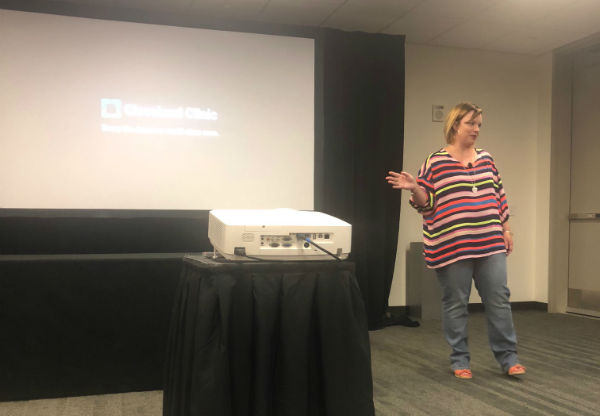
In a room overflowing with content marketers hungry to find out how to turn a blog audience into a monetizable asset, Amanda Todorovich delivered.
Todorovich, Content Marketing World’s 2016 Content Marketer of the Year, became Director of Content Marketing at the Cleveland Clinic in 2013, when their blog was only six months old and had roughly two hundred fifty thousand views per month. Now, the Health Essentials blog gets six million views per month and is the number one most-viewed hospital blog.
So, how do Todorovich and her team continue to grow their blog and turn that traffic into revenue? “You can’t think about the money first.” She stressed that trying to answer the question “what do we need to sell today?” is no way to decide what content will be most valuable for your audience.
Below are 5 steps that helped Amanda and her team grow and monetize the Health Essentials blog:
#1 – Make Your Audience Your Universe
Content has to be interesting, valuable, and useful above all else. @amandatodo #CMWorld Click To Tweet“Growing and monetizing a blog starts with amazing content that’s not about you,” explained Todorovich. If you’re not considering the needs and wants of your audience, you won’t keep them coming back, much less be able to monetize the traffic. Providing content that’s “interesting, valuable, and useful above all else,” is a must, and requires content marketers to know and listen to their audience.
Todorovich urges content marketers to use data to define their audience. “Make them as real as possible to your team. Give them a name. Give them a picture. What are their problems? How can you make decisions easier for them?” This important concept ran deep at #CMWorld this year, and jibes especially well with with the “Doris” call-out from Ann Handley’s keynote. And no wonder the know-your-audience theme resonated; Once you you’ve made data-informed decisions about what your audience wants and can think of them as individuals with real questions, you’ll know what content will resonate with your readers and keep them coming back. By letting the audience inform the content strategy, Todorovich grew the Health Essentials blog from two hundred fifty thousand views per month to one million per month in just half a year after joining the team.
Take this example: Todorovich jokes that her team can keep track of the flu season—among other things—by their audience data. Sometime around October each year, search volume grows around influenza prevention tips, then treatment methods, then “clean-up.” Ick, right? But, you better believe that the Health Essentials blog is providing content for that audience. The flu-season breakdown that Todorovich describes may be niche, but her strategy of in-depth analysis and response is something that all of us content marketers should be providing for our audience before we even think about monetizing our blogs.
#2 – Know the Landscape
Only when Todorovich was confident that the content of the blog was becoming more and more interesting, valuable, and useful to her audience did she seriously consider options for monetizing. From her time working for a digital publisher, Todorovich knew of the three most common monetization tactics: advertising, syndication, and acquisition of other publishing sources.
Todorovich confessed that the Health Essentials blog first focused on syndication “because people asked,” and that some of that syndicated content was written “in exchange for eyeballs, not money.” But with the blog’s quickly growing traffic, Todorovich recognized the biggest opportunity for monetizing the blog would lie in advertising.
And there was no shortage of obstacles to selling advertising: “We’re non-profit. Internally, nobody wanted us to advertise.” Knowing the internal and external landscape surrounding the Health Essentials blog, though, is what allowed Todorovich find her way to monetizing it. “We weren’t going to make enough money to be profitable; the problem was perception.”
To protect the brand and address the specific needs of the Cleveland Clinic (and it’s PR and legal departments), Todorovich and her team wrote a disclaimer that is shown on every ad unit on their site. It informs the reader that the ad supports the mission of the Cleveland Clinic, and links to the full, often-updated advertising policy. Sure, the policy limits the potential of advertisers—the clinic doesn’t accept advertising from alcohol or tobacco companies, for example—but creating it was necessary in order to navigate the landscape of the healthcare industry and continue to grow trust from their readers.
The same knowledge of the hospital’s internal landscape is what led Todorovich to engage a partner to help manage the advertising rather than take it on herself. In a 50/50 revenue share partnership, Todorovich and her team provide the content while their partner manages and sells all of the advertising. Both companies allow the other to focus on strengths without pushing comfort boundaries. While content marketers may not all face the same obstacles, the emphasis that Todorovich put on the need to remain flexible enough to navigate circumstances without sacrificing the integrity of the content or brand was well-received.
#3 – Start Small and Test Often
The first advertisements that were sold on the Health Essentials blog were “just traditional display” ads, said Todorovich. “We did do a small test in google, because we feared there would be a negative reaction.” But, the audience didn’t mind the advertisements on the Health Essentials blog “probably because our content is mostly news-driven. In fact, the advertisements may have even given us more credibility as a news source,” explained Todorovich.
About slowly starting to advertise on the blog, Todorovich said, “we tested our way through it. We test everything.” There’s still some slight discomfort that arises around the monetization of the Health Essentials blog. It’s based on a fear that the ads could negatively impact the credibility they’ve worked hard to build. But reassurance comes from of the team’s own commitment: “We will always be brand-first. Our content has not changed because of our advertising.”
#4 – Yesterday’s Score
Big goals are sexy, and especially tempting when it comes to monetization. But, warns Todorovich, they can be daunting and distracting, and less meaningful than smaller goals. Regardless, she said, “there’s no magic way to achieve goals. It takes effort and commitment to strategy.”
Strategies, of course, will vary based on industry, subject matter, objectives, and other factors in the marketing equation. What’s worked for the Health Essentials blog team is to huddle every day to ask and answer two questions: “What did we learn yesterday? And, what are we testing today?” Certainly two questions that would be helpful for any content marketing team to ask, especially as they begin to dabble in monetizing a blog.
The “small” goal that Todorovich and the team behind the Health Essentials blog focus on? It’s not a big annual revenue goal. Simply, it’s to “beat yesterday’s score.”
Every day we should ask ourselves two questions about content: What did we learn yesterday? What are we testing today? @amandatodo #CMWorld Click To Tweet#5 – The Revenue is Gravy
“If you’re interested in monetizing your blog,” Todorovich says, “focus on great content. Focus on your audience.” With a data-based knowledge of the audience, a commitment to valuable content, a brand-first approach to navigating obstacles, and the patience to always test new ways to beat yesterday’s score, you’ll be on your way to monetizing your blog.


